Software engineers face mounting pressure to deliver flawless code faster than ever before. Traditional manual code reviews, while thorough, create bottlenecks that slow development velocity and increase time-to-market. AI-powered code review tools emerge as revolutionary solutions, transforming how teams approach quality assurance and collaborative development.
Engineers evaluate AI Code Review Tools 2026 based on critical factors including language coverage, integration depth, customization flexibility, and deployment options. Open source alternatives provide unprecedented control for teams requiring specialized modifications. Proprietary platforms offer polished user experiences with dedicated enterprise support. Transitioning from manual reviews to AI-assisted workflows involves careful assessment of team requirements and existing infrastructure.
These intelligent systems function by leveraging sophisticated machine learning models trained on millions of code repositories. They parse abstract syntax trees, analyze semantic patterns, and generate contextual suggestions in real-time. This process accelerates feedback loops in pull requests, where changes undergo automated scrutiny before merging. Advanced Open Source PR Reviewer solutions automate GitHub comments, highlighting potential vulnerabilities, performance issues, and style violations instantly.
Open source options excel through community-driven enhancements and unlimited customization potential. Engineering teams fork repositories to implement features tailored to their specific environments and coding standards. Projects like PR-Agent facilitate rapid deployment via GitHub Actions, making enterprise-grade functionality accessible to startups and small teams. Proprietary alternatives provide scalable solutions for organizations managing extensive codebases across multiple programming languages.
1. GitHub Copilot: Revolutionary AI-Powered Development Assistant

GitHub Copilot represents a revolutionary AI code analyzer developed through collaboration between GitHub, OpenAI, and Microsoft. Beyond its renowned code generation capabilities, the platform's PR Agent feature delivers comprehensive code review functionality that transforms how development teams approach quality assurance. Copilot code review effectively offloads basic review tasks to intelligent agents that identify bugs, detect potential performance bottlenecks, and suggest actionable fixes.
Key Features:
- Real-time code analysis and suggestions that provide instant feedback during development cycles
- Integration with GitHub workflows and pull requests enabling seamless automation of review processes
- Multi-language support with context-aware recommendations covering Python, JavaScript, TypeScript, Java, Go, and 25+ additional languages
- Advanced mobile app development support specifically optimized for React Native and Flutter frameworks
The platform's PR Agent functionality examines code diffs comprehensively, identifying subtle issues that manual reviews might miss. It analyzes patterns across codebases, suggesting improvements based on best practices learned from millions of repositories. The system integrates natively with GitHub's ecosystem, automating quality checks during PR creation and providing detailed explanations for each recommendation.
Advanced capabilities encompass vulnerability detection through CodeQL integration, automated unit test generation, and legacy code explanation for maintenance projects. The platform provides framework-specific optimizations, ensuring suggestions align with React Native performance patterns and Flutter widget optimization strategies.
Strengths include exceptional IDE integration eliminating context switching overhead, rapid feedback cycles that accelerate development velocity, and continuous learning capabilities that improve suggestion accuracy over time. Limitations involve potential developer over-reliance reducing critical analysis skills, occasional inaccurate suggestions requiring manual verification, and subscription costs for advanced enterprise features.
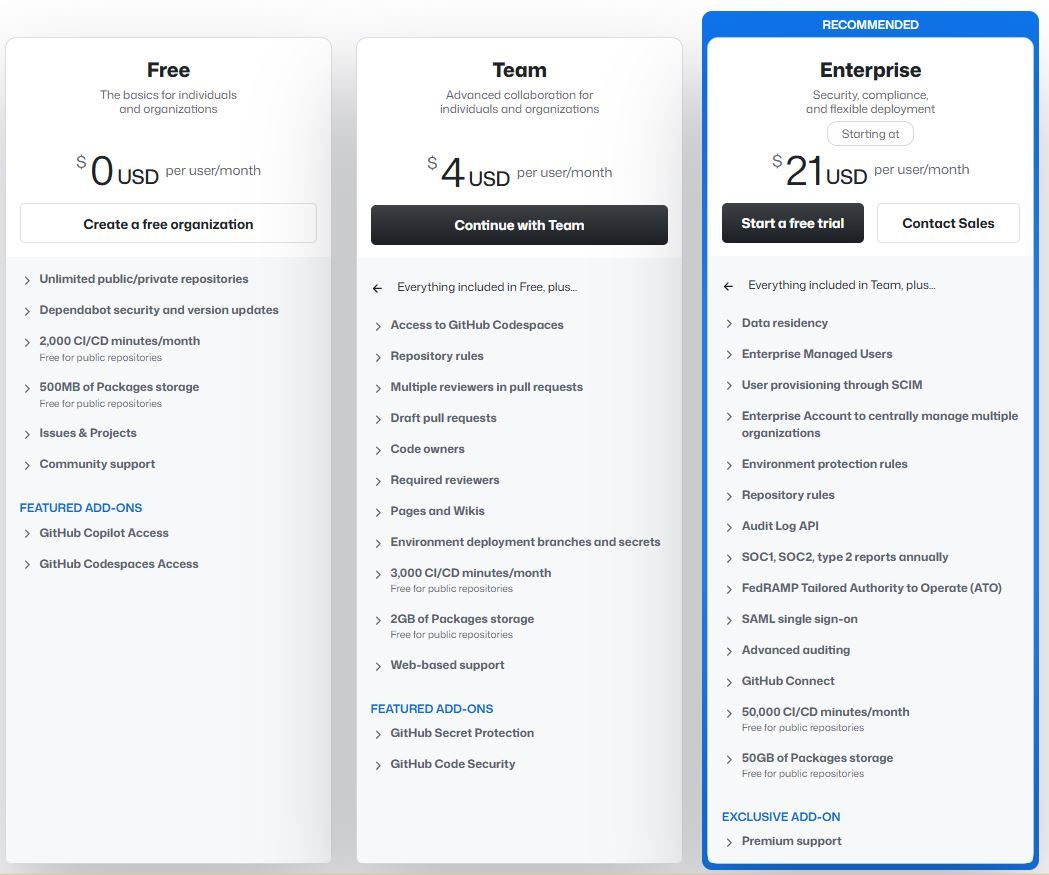
GitHub Copilot transforms development workflows by eliminating the friction between ideation and implementation. Teams adopting Copilot report 55% faster feature completion rates while maintaining code quality standards. The platform's continuous evolution ensures developers stay ahead of emerging programming paradigms and security best practices.
2. SonarQube: Comprehensive Static Analysis Platform

SonarQube is a comprehensive static analysis platform that delivers enterprise-grade code quality assessment across 30+ programming languages. The platform scans codebases for vulnerabilities, bugs, code smells, and maintainability issues while enforcing configurable quality gates that automatically block deployments when metrics fall below established thresholds.
Key Features:
- Comprehensive vulnerability detection aligned with OWASP standards and security best practices
- Multi-language support covering Java, C#, Python, JavaScript, TypeScript, Go, and 25+ additional languages
- Quality gates and CI/CD integration with Jenkins, GitHub Actions, Azure DevOps, and GitLab CI
- Technical debt quantification using industry-standard metrics and remediation cost analysis
The platform provides detailed security hotspot analysis, duplicate code identification, and comprehensive test coverage reporting with historical trend tracking. Developers access actionable insights through intuitive dashboards, receiving specific remediation guidance for each identified issue. The Community Edition supports self-hosted deployments, while cloud variants offer managed scalability for enterprise environments.
Advanced capabilities encompass custom rule development for organization-specific standards, portfolio-level analytics across multiple projects, and IDE integration through comprehensive plugin ecosystem. Machine learning enhancements predict issue severity and suggest optimal remediation sequences, positioning SonarQube prominently within AI Code Review Tools 2026.
- Developer Edition: $720/year per 100K lines of code - Enhanced features and support
- Enterprise Edition: Custom pricing - Advanced security, portfolio management, and compliance features
- Data Center Edition: Custom pricing - High availability and horizontal scalability
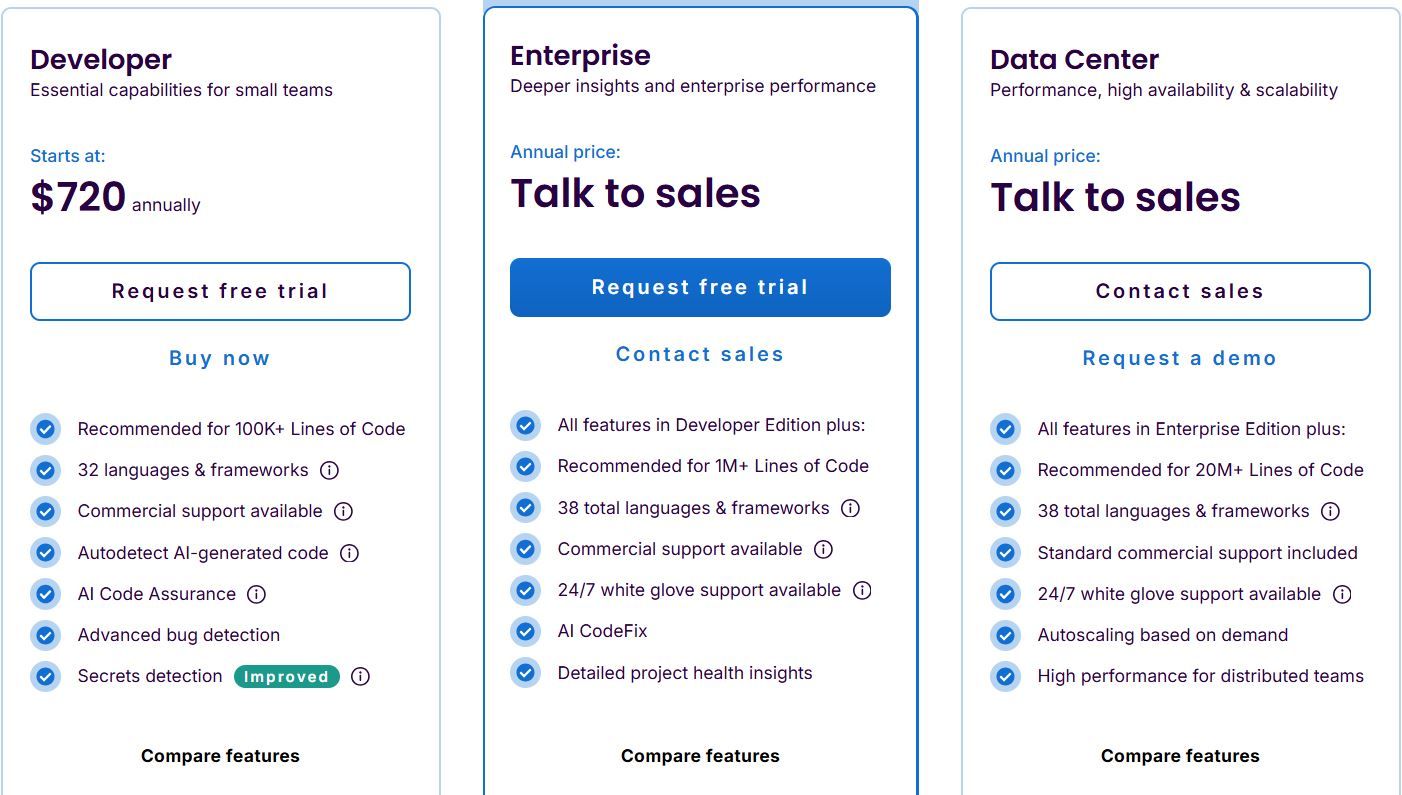
SonarQube remains the gold standard for enterprise code quality enforcement, with over 7 million developers worldwide relying on its analysis capabilities. The platform's machine learning advancements position it perfectly for organizations seeking comprehensive quality assurance without vendor lock-in concerns. Investment in SonarQube typically pays for itself within three months through reduced debugging costs alone.
3. CodeRabbit: Intelligent PR Analysis with Contextual Understanding

CodeRabbit is an intelligent AI-powered pull request analysis platform that provides comprehensive code review automation and improvement suggestions. The platform focuses on incremental code changes, utilizing advanced GPT-4 and Claude models to deliver contextually aware feedback that adapts to team patterns and project requirements over time.
Key Features:
- Line-by-line AI analysis with intelligent suggestion engines and contextual understanding
- Multi-platform integration supporting GitHub, GitLab, and Bitbucket repositories seamlessly
- Interactive chat interface for clarification queries and iterative improvement discussions
- Automated PR summarization with comprehensive walkthrough generation and merge conflict detection
The platform employs sophisticated machine learning algorithms to understand code context, identify potential issues, and suggest improvements based on established coding patterns. CodeRabbit's analysis engine covers multiple programming languages including Python, JavaScript, Java, Go, and Rust, providing specialized framework-specific recommendations.
Advanced capabilities encompass conversation threading for iterative code improvements, integration with project management tools, and customizable analysis prompts that reduce false positives while aligning suggestions with team coding standards. The open source ai-pr-reviewer component enables basic functionality through GitHub Actions, though development ceased in late 2024.
- Free Tier: $0/month - Individual developers with basic functionality
- Pro Plan: $24/month per developer - Advanced features and priority support
- Team Plan: $48/month per developer - Enhanced collaboration tools
- Enterprise: Custom pricing - Dedicated support and custom integrations
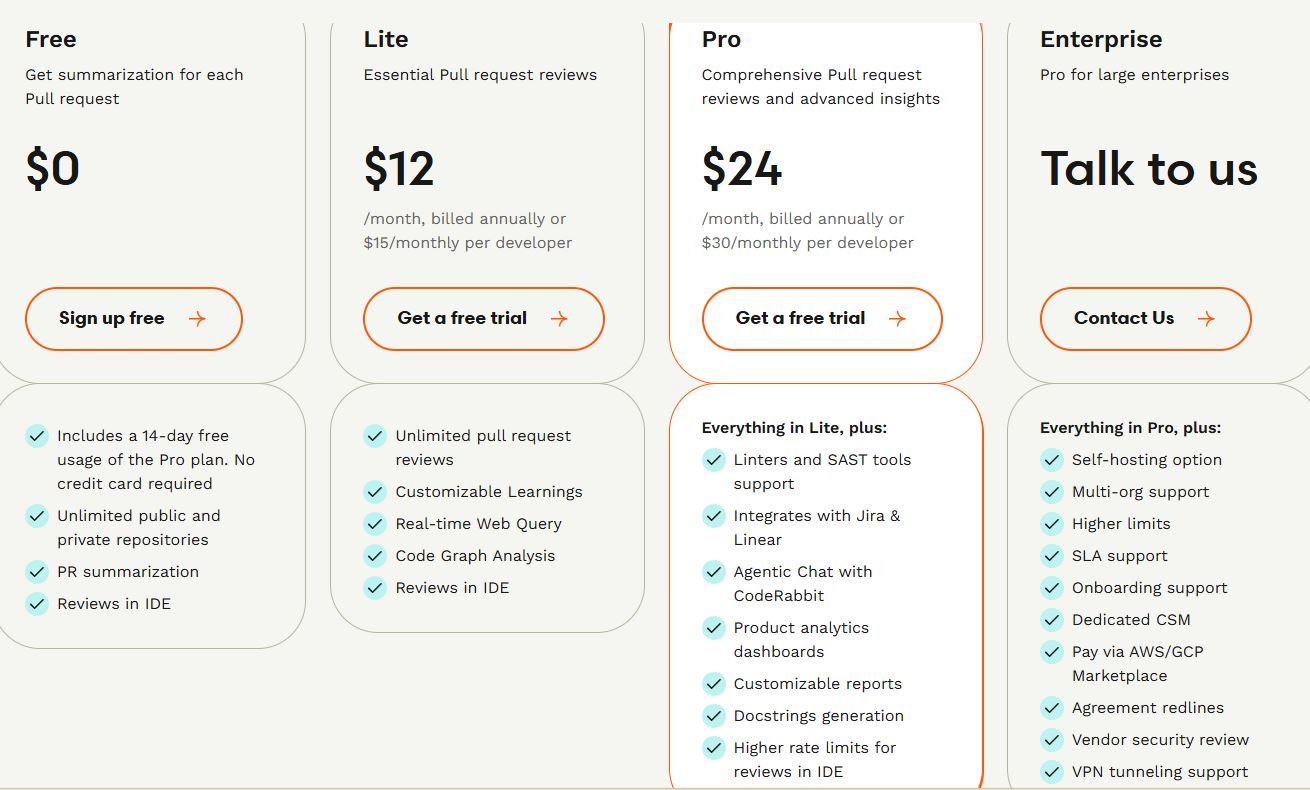
CodeRabbit excels at bridging the gap between human intuition and machine efficiency in code reviews. Early adopters consistently praise its ability to catch subtle logic errors that escape traditional static analysis tools. For teams prioritizing rapid iteration without sacrificing quality, CodeRabbit represents an ideal solution that grows smarter with every pull request.
4. Snyk Code: Security-First AI Vulnerability Detection Platform
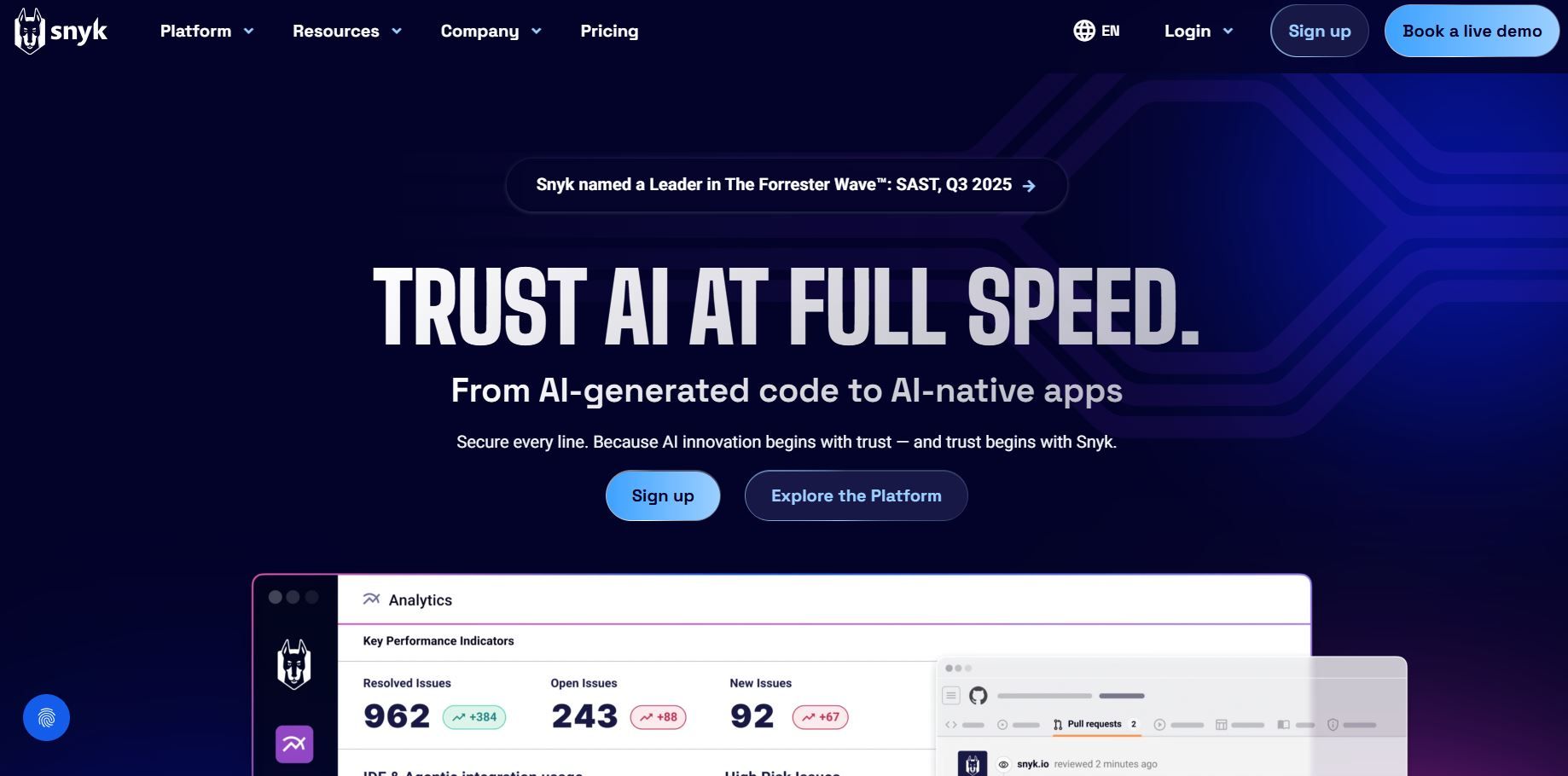
Snyk Code is a specialized AI-powered security analysis platform that focuses on real-time vulnerability detection across 15+ programming languages with automated remediation suggestions. The platform integrates seamlessly with development environments and repositories, scanning for critical security issues including injection attacks, authentication bypasses, and cryptographic weaknesses through advanced data flow analysis.
Key Features:
- Real-time security scanning with comprehensive vulnerability detection using OWASP Top 10 framework
- One-click remediation providing automated fix suggestions with detailed implementation guidance
- CI/CD pipeline integration with automated security gates and deployment blocking capabilities
- Container and infrastructure scanning for Docker images and infrastructure-as-code security analysis
The platform utilizes sophisticated data flow analysis covering millions of vulnerability scenarios drawn from extensive security research databases. Snyk Code provides prioritized fix recommendations based on exploitability assessments, automated pull request generation with security patches, and comprehensive compliance reporting for regulatory frameworks including SOC 2, HIPAA, and PCI DSS.
Advanced functionality encompasses IDE integration providing real-time feedback during development, CVE database integration for known vulnerability detection, and proprietary research capabilities identifying zero-day attack patterns. The platform supports custom security policy enforcement and generates detailed audit reports suitable for compliance documentation.
- Free Tier: $0/month - Individual developers and small projects with basic scanning
- Team Plan: $25/month per developer - Advanced security features and team collaboration
- Business Plan: $52/month per developer - Enhanced compliance and reporting capabilities
- Enterprise: Custom pricing - Dedicated support, advanced integrations, and compliance certifications
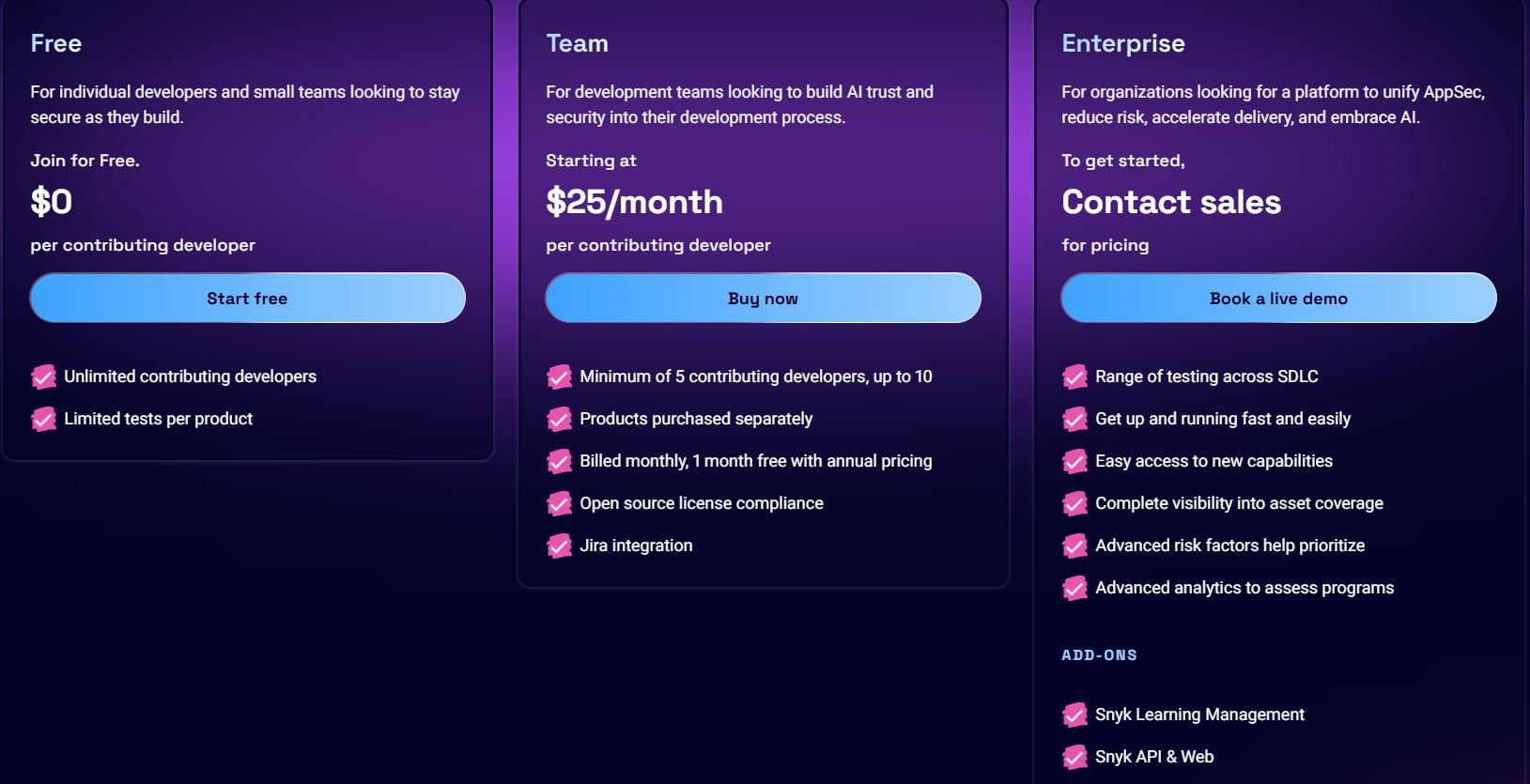
Security-conscious organizations view Snyk Code as non-negotiable infrastructure rather than optional tooling. The platform's ability to prevent data breaches through proactive vulnerability detection has saved companies millions in potential damages. For development teams where security failures could result in regulatory penalties or reputation damage, Snyk Code provides essential protection that justifies its premium positioning.
5. Codacy: Metrics-Driven Quality Enforcement Platform

Codacy is a comprehensive automated code quality platform that analyzes codebases for duplicates, complexity metrics, and test coverage across 40+ programming languages. The platform automates quality gates within CI/CD pipelines while providing IDE plugins for immediate developer feedback, emphasizing actionable insights that guide systematic code improvements.
Key Features:
- Comprehensive quality metrics including duplicate detection, cyclomatic complexity, and technical debt quantification
- Automated CI/CD integration with quality gates and deployment blocking based on configurable thresholds
- Real-time IDE feedback through plugins providing immediate code quality suggestions during development
- Custom rule enforcement enabling organization-specific coding standards and architectural constraint implementation
The platform provides sophisticated technical debt analysis using industry-standard metrics, hotspot identification highlighting critical improvement areas, and comprehensive trend tracking measuring quality evolution over time. Developers configure custom pattern detection rules to enforce coding standards while accessing detailed dashboard analytics.
Advanced capabilities encompass automated code review comment generation, seamless integration with project management tools for issue tracking, and team productivity analytics measuring review velocity and quality improvement trends. The platform supports custom dashboard creation enabling stakeholders to monitor metrics aligned with business objectives.
- Open Source: Free - Public repositories with community support
- Team Plan: $18/month per developer - Private repositories with advanced features
- Business: For leading organizations with enterprise-level security and reporting requirements
- Enterprise: Custom pricing - Dedicated support and advanced integrations
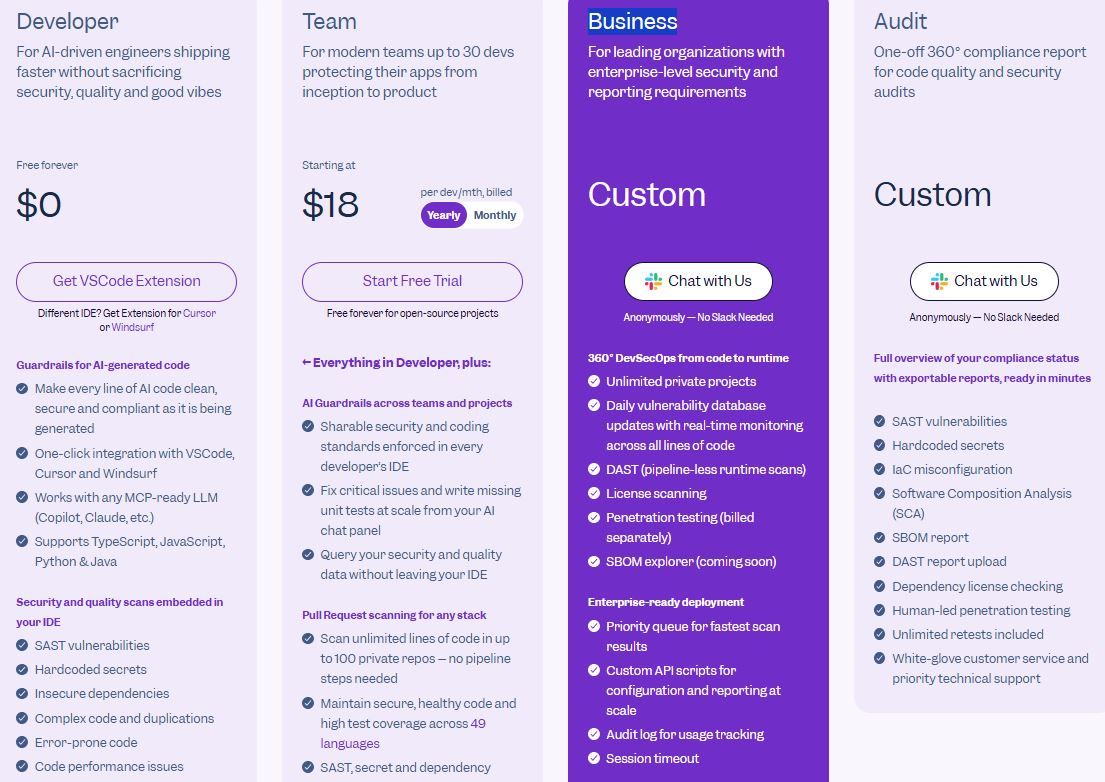
Engineering managers appreciate Codacy's ability to transform subjective code quality discussions into objective, data-driven decisions. The platform's trend analysis helps teams identify whether technical debt is growing or shrinking over time, enabling proactive rather than reactive quality management. Organizations using Codacy report 40% fewer emergency fixes and significantly improved developer satisfaction scores.
6. CodeClimate: Performance-Focused Development Analytics

CodeClimate is a sophisticated development intelligence platform that delivers comprehensive code quality analysis with emphasis on maintainability optimization and performance enhancement. The platform provides line-level test coverage analysis, critical hotspot detection, and team velocity tracking for development productivity measurement throughout the entire software lifecycle.
Key Features:
- Advanced maintainability scoring based on industry benchmarks with technical debt estimation
- Line-level test coverage analysis providing detailed insights into code quality and testing gaps
- Automated issue prioritization using severity and frequency metrics for optimal resource allocation
- Team velocity analytics measuring delivery performance and development productivity trends
The platform integrates seamlessly with CI/CD pipelines enabling automated quality enforcement, supports popular programming languages including Ruby, Python, JavaScript, and PHP with specialized web framework analyzers. CodeClimate provides comprehensive pull request quality assessment, automated issue triaging based on historical patterns, and detailed team performance insights.
Advanced functionality encompasses webhook support for custom workflow automation, integration with GitHub, GitLab, and Bitbucket repositories, and sophisticated analytics dashboards providing actionable optimization guidance for architectural decisions. The platform generates detailed reports suitable for stakeholder communication and strategic planning.
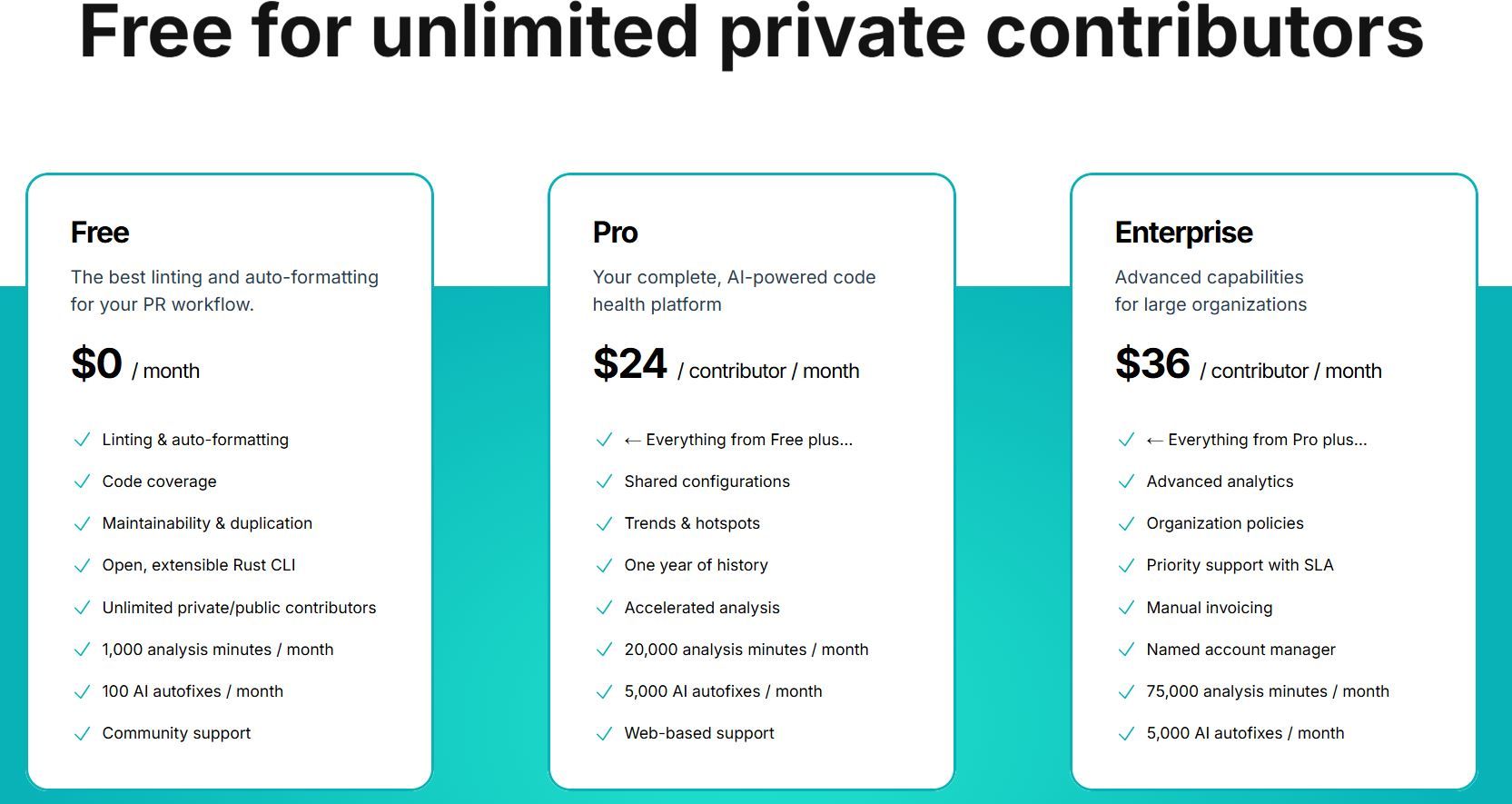
CodeClimate shines brightest in environments where engineering velocity directly impacts business outcomes. The platform's ability to correlate code quality with delivery speed helps CTOs make informed decisions about technical investments. Companies leveraging CodeClimate's insights consistently outperform competitors in both development speed and product reliability metrics.
7. Amazon CodeGuru: AWS-Native Application Intelligence

Amazon CodeGuru is an AI-powered application profiling and security analysis platform specifically engineered for AWS cloud environments. The platform scans Java, Python, and JavaScript applications delivering comprehensive performance bottleneck identification and cost optimization recommendations through deep integration with AWS services and cloud-native architectures.
Key Features:
- Runtime performance profiling with CPU hotspot identification and memory leak detection capabilities
- AWS cost optimization providing recommendations based on actual resource utilization patterns
- Continuous production monitoring with automated alerting for performance degradation detection
- Native AWS integration seamlessly connecting with CodePipeline, CodeBuild, and CloudFormation services
The platform provides sophisticated machine learning capabilities that analyze application behavior under real-world conditions, offering detailed visualization dashboards and comprehensive performance insights. CodeGuru's security analysis covers common vulnerabilities while incorporating AWS-specific configuration best practices and cloud security frameworks.
Advanced functionality encompasses automated performance recommendations with implementation guidance, integration with AWS monitoring and logging services, and pay-per-use pricing models eliminating upfront infrastructure commitments. The platform continuously learns from application patterns, improving suggestion accuracy and relevance over time.
- Pay-as-you-go pricing
Amazon CodeGuru proves indispensable for organizations heavily invested in AWS infrastructure, where optimization recommendations directly reduce monthly cloud bills. Teams frequently discover performance improvements worth thousands of dollars in reduced compute costs. The platform's tight integration with AWS services makes it particularly valuable for serverless and containerized applications where resource efficiency directly impacts operating expenses.
8. PR-Agent by Qodo AI: Ultimate Open Source PR Reviewer

PR-Agent is a revolutionary open source AI-powered pull request automation platform that provides comprehensive analysis using multiple language models including Claude, GPT-4, and Gemini. This flexible solution supports various LLM providers, offering unprecedented customization for organizations with specific model preferences, budget constraints, or security requirements.
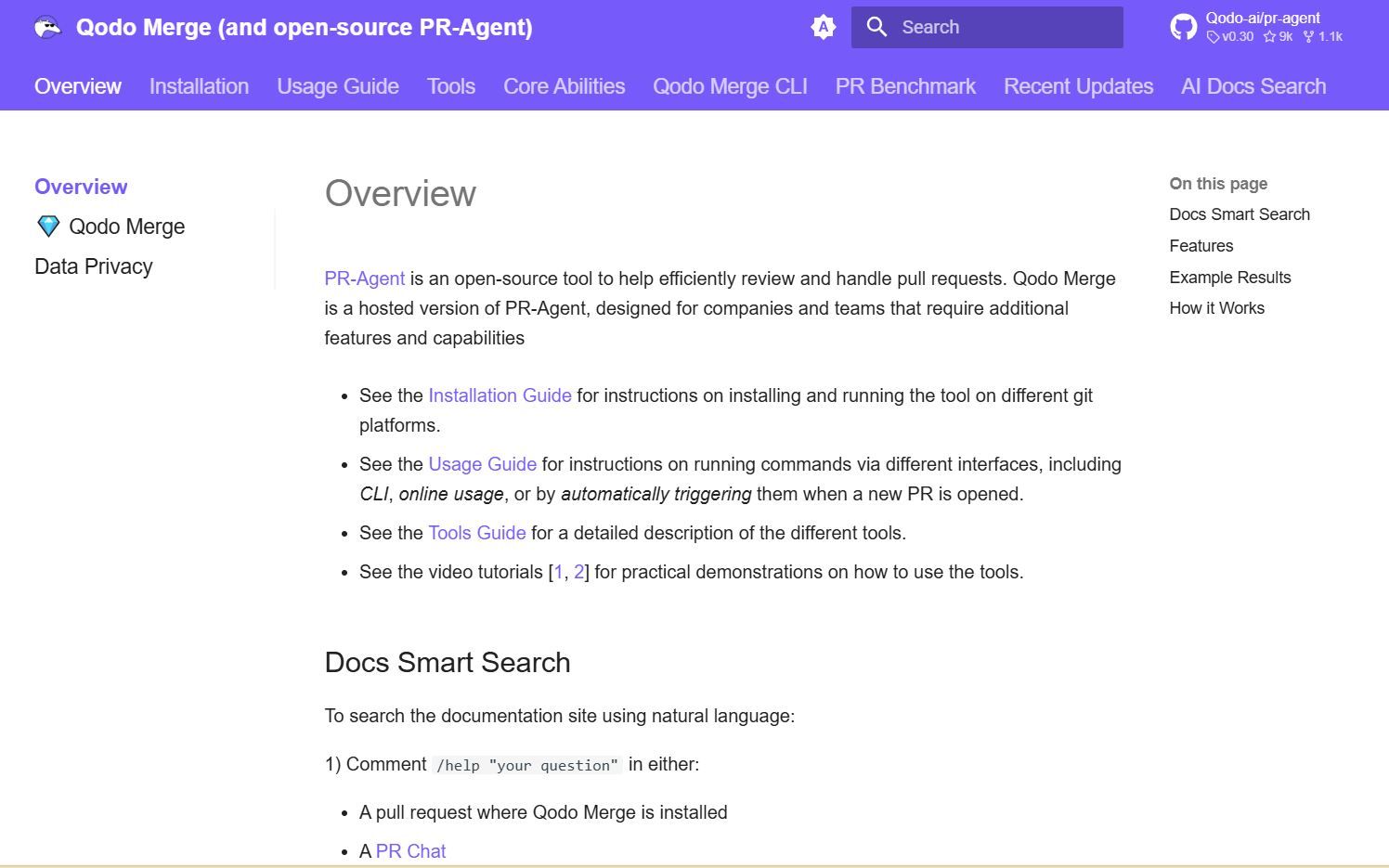
Key Features:
- Multi-LLM support with flexible provider selection including Claude, GPT-4, Gemini, and custom model endpoints
- Comprehensive PR commands including /review for detailed analysis, /improve for code enhancement, and /describe for automated summaries
- Intelligent compression processing large pull requests through advanced techniques while maintaining analysis quality
- Flexible deployment options supporting cloud, self-hosted, and hybrid configurations for enhanced security control
The platform's modular architecture emphasizes extensibility, enabling developers to customize analysis engines according to project-specific requirements. PR-Agent processes complex pull requests through sophisticated compression algorithms, maintains conversation context across multiple review cycles, and supports JSON configuration for precise behavior modification.
Advanced capabilities encompass security vulnerability scanning with OWASP integration, performance impact analysis with benchmarking suggestions, and coding standard enforcement through customizable YAML configuration files. The platform integrates seamlessly with GitHub, GitLab, and Bitbucket through webhooks, supporting both cloud and on-premises deployments.
Pricing Structure:
- Open Source: Free - Complete access to core functionality with community support
- Self-Hosted: Free - Full control over deployment and customization with optional LLM costs
- Enterprise Support: Custom pricing - Professional implementation assistance and dedicated support
- Managed Service: Contact sales - Fully managed deployment with SLA guarantees
PR-Agent represents the democratization of enterprise-grade code review capabilities, making sophisticated analysis accessible to startups and independent developers. The platform's open source nature has sparked numerous innovations, with community contributions enhancing functionality faster than traditional proprietary development cycles. For teams seeking maximum flexibility without budget constraints, PR-Agent offers unparalleled value and customization potential.
9. Kodus AI: Adaptive Senior Developer Experience Platform
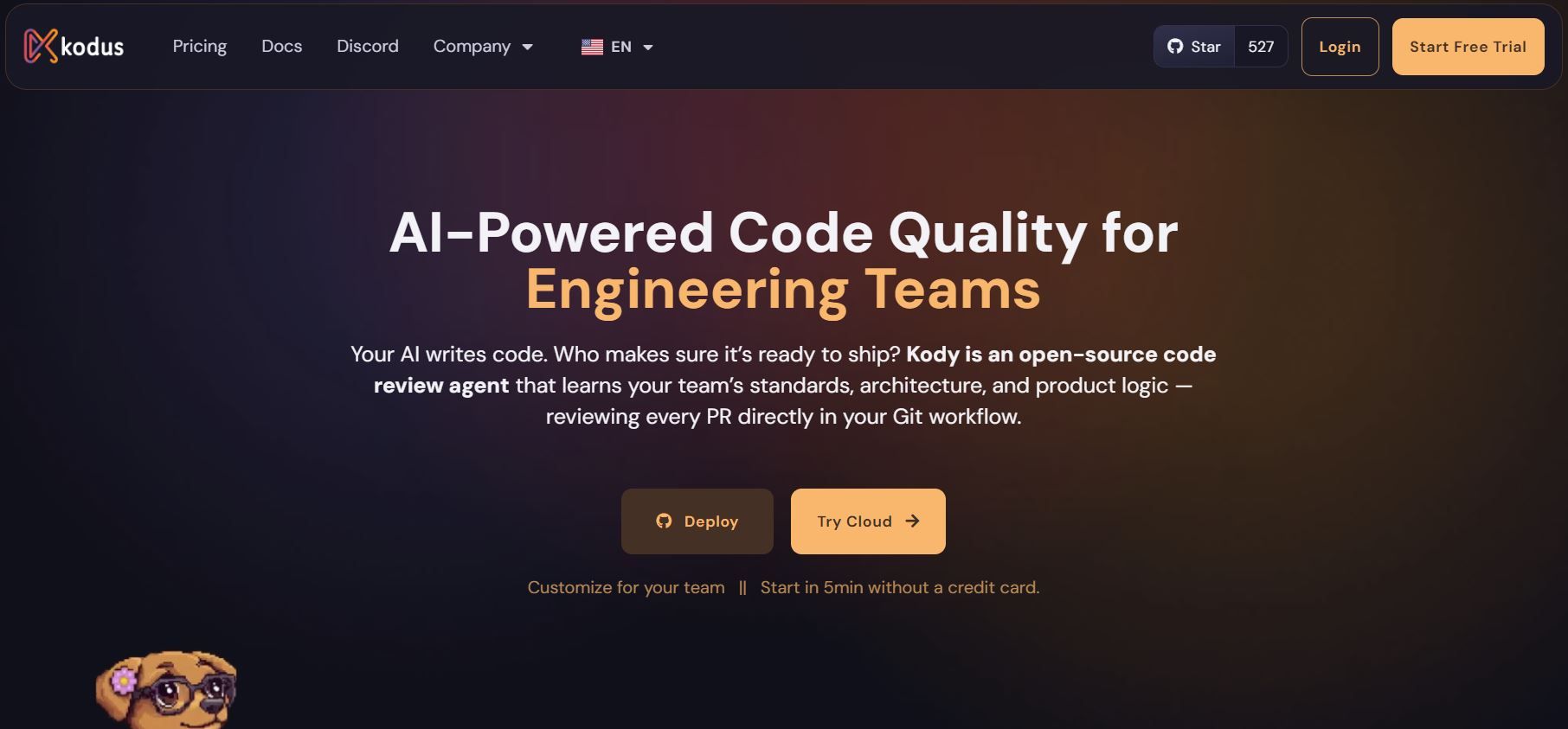
Kodus AI is an innovative open source code review platform that delivers sophisticated review experiences mimicking senior developer expertise through advanced language model integration and abstract syntax tree analysis. The platform continuously learns team-specific coding standards, adapting suggestions to match established architectural patterns and decision-making frameworks within existing codebases.
Key Features:
- Continuous learning capabilities that improve suggestion accuracy and relevance over time through team feedback
- Advanced AST parsing providing deep code structure understanding beyond surface-level text analysis
- Custom policy enforcement configurable for organization-specific requirements and coding standards
- Self-hosted deployment enabling complete data control and privacy for security-sensitive environments
The platform employs sophisticated machine learning algorithms trained on senior developer decision patterns, providing contextually relevant feedback that considers project architecture, coding conventions, and technical debt implications. Kodus AI supports extensible architecture through plugin development, enabling community-driven feature enhancement and specialized domain integration.
Technical implementation encompasses integration with popular development tools and workflows, comprehensive analysis covering security vulnerabilities, performance bottlenecks, and maintainability concerns. Teams configure review criteria through intuitive interfaces while maintaining flexibility for specialized requirements and custom rule development.
- Open Source: Free - Complete platform access with community support and unlimited customization
- Community Support: Free - Access to community forums, documentation, and peer assistance
- Professional Support: Contact sales - Implementation assistance and dedicated technical support
- Enterprise Consulting: Custom pricing - Specialized customization and integration services
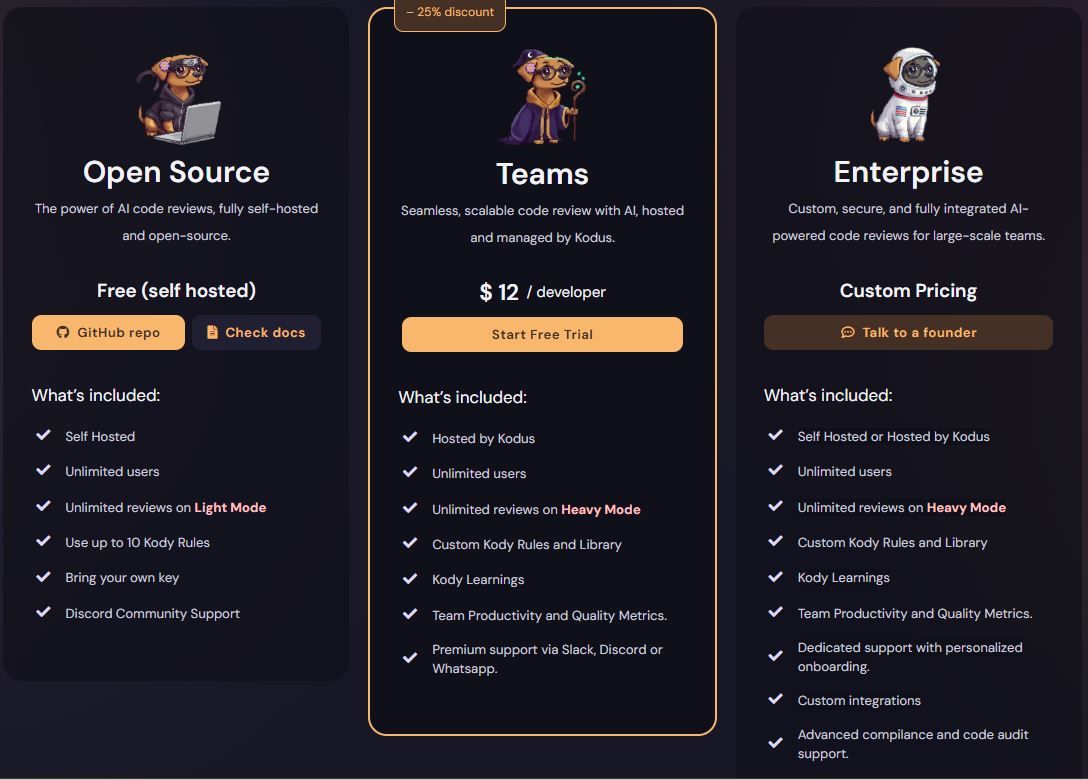
Kodus AI distinguishes itself by providing feedback that feels genuinely human rather than mechanically generated. Beta users consistently report that Kodus suggestions mirror the thoughtful guidance typically received from senior developers during mentoring sessions. The platform's adaptive learning creates a personalized experience that improves alongside team expertise, making it particularly valuable for growing engineering organizations.
10. Refact.ai: Privacy-First Local Code Intelligence

Refact.ai is a specialized privacy-first code analysis platform that prioritizes data sovereignty through local processing capabilities, supporting Python, JavaScript, and TypeScript analysis without external data transmission. This open source solution emphasizes security-conscious organizations requiring complete control over code and review data flows while maintaining sophisticated AI-powered analysis capabilities.
Key Features:
- Complete local processing ensuring data never leaves organizational infrastructure boundaries
- Multi-language support covering Python, JavaScript, and TypeScript with framework-specific optimizations
- Air-gapped operation enabling functionality in restricted network environments common in regulated industries
- Extensible architecture supporting custom analyzer development and specialized domain integration
The platform's security architecture includes comprehensive on-premises deployment options, encrypted data handling throughout all processing pipelines, and configurable integration endpoints for controlled external service connections. Teams customize analysis rules according to specific requirements, configure privacy settings for organizational compliance, and extend functionality through open source community contributions.
Technical capabilities encompass real-time code analysis during active development sessions, seamless integration with popular IDEs and editors, and comprehensive API endpoints enabling custom workflow automation. The platform supports offline operation requirements, ensuring continuous functionality regardless of external connectivity constraints.
- Open Source: Free - Complete platform access with community support and unlimited customization rights
- Self-Hosted: Free - Full deployment control with optional commercial support packages
- Implementation Support: Contact sales - Professional deployment assistance and customization services
- Enterprise Consulting: Custom pricing - Specialized integration and compliance consulting services
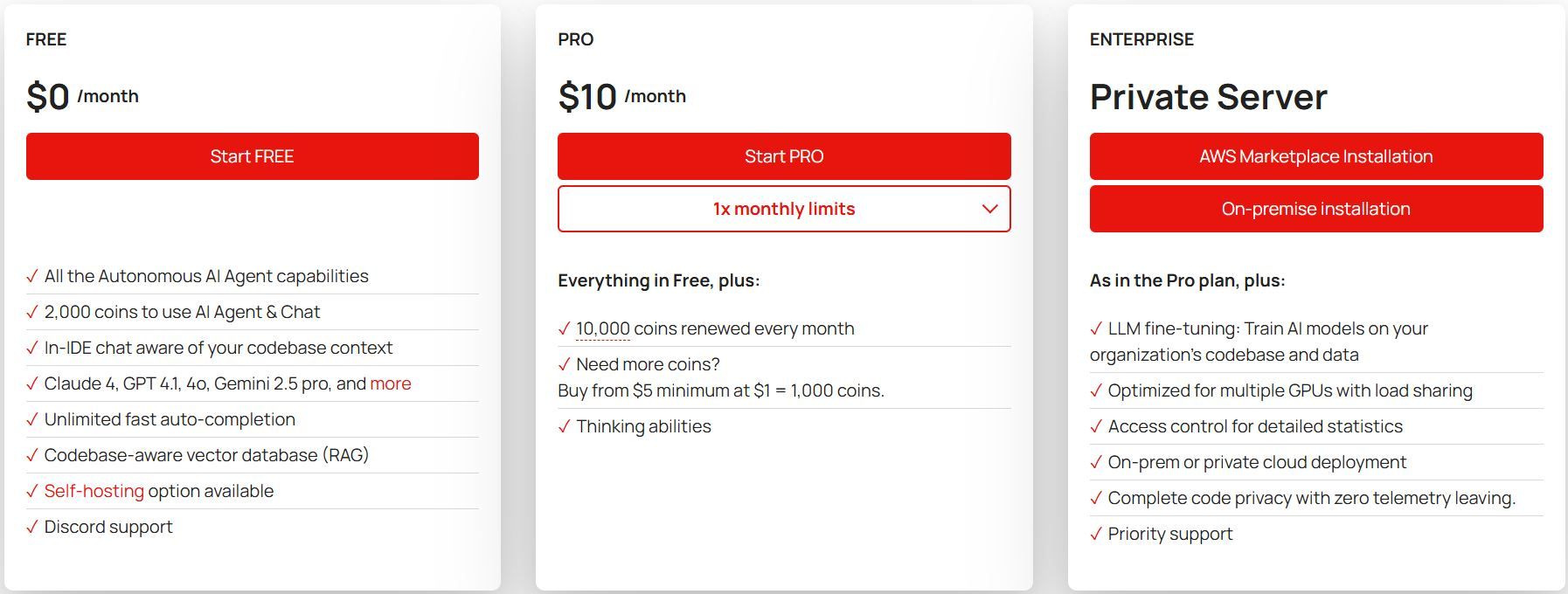
Refact.ai serves a critical niche for organizations where data privacy concerns override convenience considerations. Government agencies and financial institutions have adopted Refact.ai specifically for its air-gapped operation capabilities and complete data sovereignty. While feature scope may be narrower than cloud-based alternatives, the platform provides irreplaceable value for security-sensitive environments where external data transmission is simply not acceptable.
Emerging Trends Shaping AI Code Review Tools 2026
The evolution of AI Code Review Tools 2026 demonstrates clear trends toward multi-model architectures, hybrid deployment strategies, and seamless integration ecosystems. Organizations increasingly demand solutions supporting multiple language models, enabling optimal performance and cost management through provider diversity. Hybrid deployments combine cloud processing power with local data control, addressing security requirements without sacrificing functionality.
Integration depth expands beyond version control systems to encompass project management, communication platforms, and development infrastructure. Modern tools integrate with Slack for notification management, Jira for issue tracking, and comprehensive API platforms like Apidog for holistic development workflow optimization.

Machine learning capabilities advance through specialized model training on domain-specific codebases, improving suggestion accuracy and reducing false positive rates. Open Source PR Reviewer solutions gain enterprise adoption through community-driven enhancements and professional support options.
Security focus intensifies as cyber threats evolve, with platforms incorporating threat intelligence, zero-day vulnerability detection, and compliance framework alignment. Privacy-preserving architectures enable sensitive organizations to adopt AI assistance without compromising data sovereignty.
Performance optimization becomes paramount as codebases grow larger and development cycles accelerate. Tools implement intelligent caching, incremental analysis, and distributed processing to maintain response times while scaling analysis depth.
Strategic Selection Framework for Development Teams
Choosing optimal AI Code Review Tools 2026 requires systematic evaluation across multiple dimensions including team size, security requirements, customization needs, and budget constraints. Small teams often benefit from open source solutions offering flexibility without licensing costs, while enterprises may prefer commercial platforms providing dedicated support and compliance certifications.
Technical evaluation criteria encompass language support breadth, integration capabilities, customization potential, and deployment flexibility. Teams prioritizing security should emphasize vulnerability detection accuracy, compliance framework support, and data handling practices. Organizations requiring specialized functionality benefit from open source platforms enabling custom development.
Cost analysis extends beyond subscription fees to include implementation overhead, training requirements, and ongoing maintenance responsibilities. Open source alternatives require technical expertise for deployment and customization but eliminate recurring licensing costs. Commercial solutions provide managed services reducing operational burden while incurring predictable subscription expenses.
Maximizing ROI Through Strategic Implementation
Successful AI code review implementation generates measurable returns through reduced review cycles, improved defect detection rates, and enhanced developer productivity. Organizations report average ROI realization within 6-12 months through quantifiable improvements in development velocity and code quality metrics.
Productivity gains manifest through automated analysis reducing manual review time by 40-70%, faster feedback cycles enabling rapid iteration, and consistent quality enforcement across development teams. Quality improvements include 25-40% reduction in production defects, enhanced security posture through automated vulnerability detection, and improved maintainability through coding standard enforcement.
Risk mitigation encompasses early vulnerability detection preventing security incidents, compliance automation reducing regulatory violation risks, and consistent quality standards minimizing technical debt accumulation. Financial impact analysis should consider both direct cost savings and risk reduction benefits.
Navigating the AI Code Review Revolution
The landscape of AI Code Review Tools 2026 offers unprecedented opportunities for development teams seeking quality improvement, productivity enhancement, and security strengthening. From comprehensive open source solutions like PR-Agent providing unlimited customization potential to enterprise platforms offering managed services and dedicated support, options exist for every organizational requirement.
Open Source PR Reviewer solutions demonstrate particular promise for teams prioritizing flexibility, cost control, and customization capabilities. These platforms enable organizations to implement specialized functionality while building internal expertise and avoiding vendor lock-in scenarios. Meanwhile, commercial solutions provide polished experiences, professional support, and comprehensive feature sets justifying higher investment levels.
The future of code review increasingly involves AI-powered automation complementing human expertise for complex architectural decisions and creative problem-solving. Teams investing in modern AI code review tools today position themselves for sustained competitive advantage in the rapidly evolving software development landscape.
Transform your development workflow today by selecting appropriate AI code review tools and enhancing your ecosystem with Apidog's comprehensive API platform. Download Apidog for free to create seamless integration between code review processes and API development, testing, and documentation workflows.



